Healthcare IT is way more complex for healthcare providers than ever before. Therefore, the importance of robust IT infrastructure doesn’t need to be overstated. Managed IT services for healthcare have become a cornerstone for healthcare organizations aiming to enhance operational efficiency, ensure data security, and improve patient care. We will uncover the essential aspects of managed IT, highlighting their benefits, critical components, best practices, and how they contribute to better patient outcomes.
What Are Healthcare Managed IT Services?
Managed IT involves outsourcing the management and maintenance of a healthcare organization’s IT infrastructure to a specialized provider. These services encompass a wide range of IT functions, including system monitoring, data security, network management, software updates, and technical support. Healthcare organizations can leverage the expertise of healthcare IT-managed service providers to focus on their core mission of delivering quality patient care while ensuring their IT systems are secure, compliant, and efficient.
Benefits of Healthcare Managed IT Services
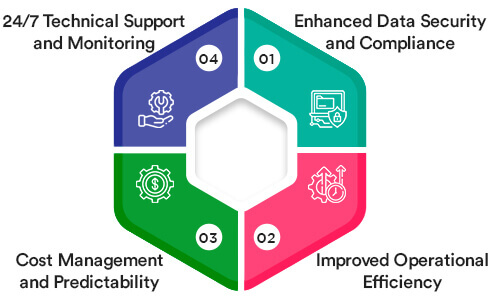
1. Enhanced Data Security and Compliance
Healthcare organizations handle vast amounts of sensitive patient data, prioritizing data security. Managed IT services for healthcare provide robust security measures, including encryption, firewalls, and intrusion detection systems, to protect against data breaches and cyberattacks. Additionally, healthcare managed service providers ensure compliance with healthcare regulations such as HIPAA, GDPR, and HITECH, reducing the risk of legal and financial penalties.
2. Improved Operational Efficiency
By outsourcing IT management, healthcare providers can streamline their operations. Healthcare IT solutions providers handle routine maintenance, system updates, and troubleshooting, allowing healthcare staff to focus on patient care. This leads to reduced downtime, faster issue resolution, and more efficient use of resources.
3. Cost Management and Predictability
Managed healthcare IT services often operate on a subscription-based model, providing predictable monthly costs. This helps hospital management systems budget more effectively and avoid unexpected expenses related to IT infrastructure failures or upgrades. Additionally, healthcare IT providers can optimize IT spending by recommending cost-effective solutions and eliminating unnecessary expenditures.
4. 24/7 Technical Support and Monitoring
Healthcare facilities require round-the-clock IT support to ensure continuous operation of critical systems. Managed IT services for healthcare offer 24/7 monitoring and support, ensuring that issues are promptly addressed and minimizing disruption to patient care.
Critical Components of Managed IT Services
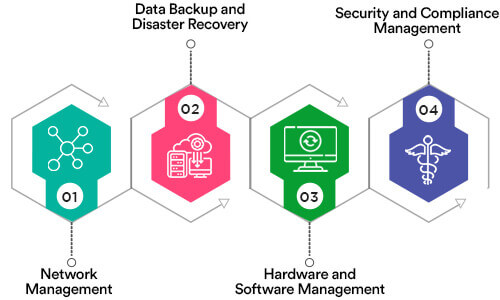
1. Network Management
Effective network management is crucial for maintaining connectivity and ensuring secure data transmission. MSPs monitor network performance, manage bandwidth, and implement security protocols to protect against unauthorized access and data breaches.
2. Data Backup and Disaster Recovery
Regular data backups and a robust disaster recovery plan are essential to protect patient information and ensure business continuity. Healthcare IT service providers include automated backups, secure storage solutions, and recovery plans to restore data quickly in an emergency.
3. Hardware and Software Management
MSPs handle the procurement, installation, and maintenance of hardware and software. This includes regular updates, patches, and upgrades to ensure systems run smoothly and securely.
4. Security and Compliance Management
Ensuring compliance with healthcare regulations and maintaining data security are paramount. Managed IT services for healthcare provide comprehensive security assessments, vulnerability scanning, and compliance audits to identify and mitigate risks.
How Managed IT Services Improve Patient Care?
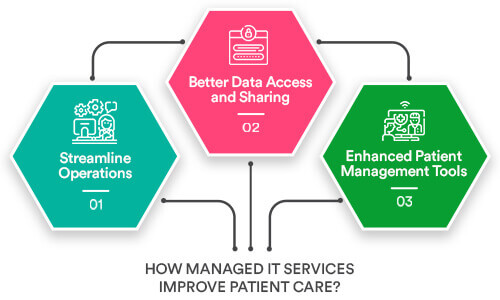
1. Streamline Operations
By managing IT infrastructure efficiently, MSPs enable healthcare providers to streamline administrative processes, reduce paperwork, and automate routine tasks. This allows healthcare professionals to spend more time with patients, improving the overall quality of care.
2. Better Data Access and Sharing
Managed IT services for healthcare facilitate secure data access and sharing among healthcare providers. This ensures that patient information is readily available when needed, leading to more informed decision-making and coordinated care.
3. Enhanced Patient Management Tools
MSPs support the implementation of patient engagement solutions and tools such as patient portals, telehealth services, and mobile health applications. These tools empower patients to take an active role in their healthcare, improving satisfaction and outcomes.
Challenges and Considerations
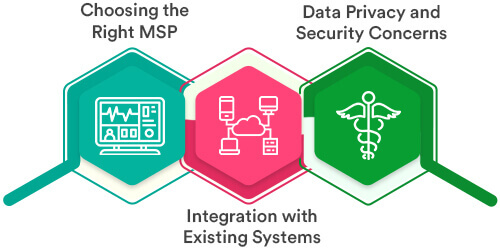
1. Choosing the Right MSP
Selecting an appropriate MSP is one of healthcare organizations’ most critical decisions. Not all MSPs have the necessary experience or understanding of healthcare-specific needs and regulations.
It’s vital to evaluate potential providers based on their track record, expertise in the healthcare sector, and ability to provide comprehensive services tailored to the organization’s specific needs. Engaging with an MSP that needs more healthcare knowledge could result in compliance issues, data breaches, and suboptimal IT performance.
2. Integration with Existing Systems
Integrating managed IT services with an organization’s existing systems can present significant challenges. Legacy systems, proprietary software, and custom applications often have unique requirements and compatibility issues.
The MSP must be adept at handling these complexities to ensure seamless integration without disrupting ongoing operations. This might involve extensive customization, configuration, and sometimes even replacement of outdated systems. Proper planning and phased implementation can mitigate these risks, ensuring a smooth transition to healthcare managed services.
3. Data Privacy and Security Concerns
Despite MSPs’ robust security measures, healthcare organizations must remain vigilant about data privacy and security. The increasing sophistication of cyberattacks necessitates continuous monitoring, regular security audits, and updates to security protocols.
Organizations must also ensure that the MSP adheres to all regulatory requirements for data protection, such as HIPAA, GDPR, and HITECH. HIPAA-compliant software solutions implement strict access controls, encrypt sensitive data, and conduct regular staff training on cybersecurity best practices essential to safeguard patient information.
Choosing the Right Managed IT Service Provider
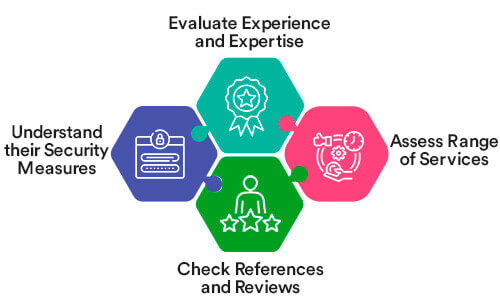
1. Evaluate Experience and Expertise
When selecting an MSP, evaluating their experience and expertise is essential, particularly in the healthcare sector. A provider with a proven track record in managing healthcare IT solutions will be more familiar with the industry’s unique challenges and regulatory requirements. This experience enables them to offer tailored solutions that address specific needs, ensuring that the organization’s IT infrastructure is compliant and optimized for performance.
2. Assess Range of Services
A comprehensive suite of services is a crucial factor when choosing an MSP. Healthcare organizations should look for providers that offer a wide range of services, including network management, data security, compliance support, software and hardware management, and 24/7 technical assistance. The ability to provide end-to-end IT solutions ensures that all aspects of the organization’s IT infrastructure are covered, reducing the need to engage multiple vendors.
3. Check References and Reviews
Verifying an MSP’s credibility through references and reviews from other healthcare clients can provide valuable insights into its reliability and performance. Speaking with current or past clients can highlight the provider’s strengths and potential areas for improvement. Online reviews and testimonials also offer a broader perspective on the MSP’s reputation and customer satisfaction levels.
4. Understand their Security Measures
Given the critical importance of data security in healthcare, it’s imperative to understand the MSP’s security protocols. This includes data encryption, access controls, and intrusion detection approaches. Additionally, the MSP should have robust disaster recovery plans and procedures to handle data breaches or system failures. Ensuring that the provider follows industry best practices and complies with all relevant regulations is key to maintaining the integrity and confidentiality of patient data.
End Thoughts
Managed IT solutions are integral to modernizing and securing healthcare IT infrastructure. By outsourcing IT management to experienced providers, healthcare organizations can enhance data security, improve operational efficiency, and deliver better patient care. As the healthcare industry continues to evolve, managed IT services for medical practices will play a critical role in navigating the complexities of technology and ensuring that healthcare providers remain focused on what matters most-patient well-being.
The post Navigating Healthcare Managed IT Services: Key Benefits and Best Practices appeared first on Osplabs.






